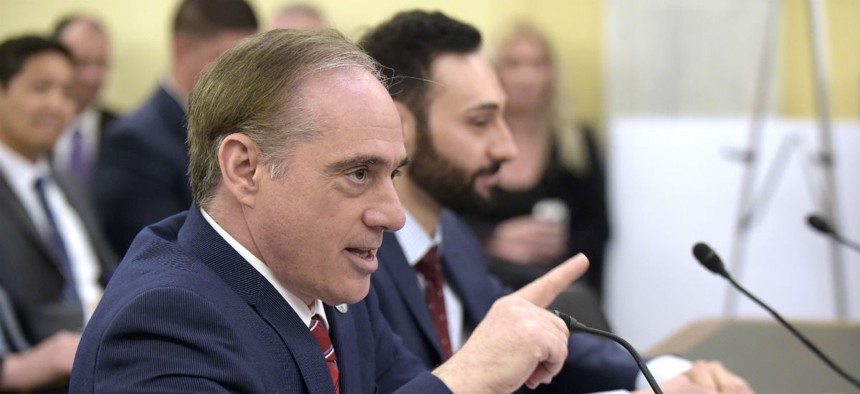Bill to Boost VA Hiring, Private Care Heads to Trump's Desk
Measure will provide $3.9 billion in emergency funds to VA.
The Veterans Affairs Department will soon receive an influx of cash and flexibility to boost its facilities and staffing levels, under a bill approved by the Senate Wednesday that will now head to President Trump’s desk.
The 2017 VA Choice and Quality Employment Act is a compromise bill put together to address a funding crisis for the Veterans Choice Program, an initiative to boost access to private sector care that was set to run out of funding this month. The measure was Congress’ second attempt in recent weeks to save the program, with the first effort struck down by Democrats looking to preserve equal spending boosts for both internal and external health care.
The legislation will provide $2.1 billion to the Choice program, extending its life for six months. While the original bill that failed to make it out of the House invested only in the private care expansion, the bill headed for Trump’s signature provides an additional $1.8 billion for the Veterans Health Administration. That spending, passed unanimously in both houses on an emergency basis, will include medical leases for 28 new facilities.
Following a reform Trump signed into law in June that would hasten the disciplinary process, the new bill will provide direct hire authority for positions with a “severe shortage of candidates,” as well as for certain qualified recent graduates and post-secondary students. The measure will also create an exchange in which private sector workers would temporarily fill VA slots while department employees would work at the private organization. The swaps would last for one year.
To help with recruiting, the bill will require VA to create a standardized exit survey for departing employees and a database of every vacancy that is critical or difficult to fill. It will launch a virtual human resources academy within VA to ensure those employees maintain an adequate understanding of recruiting and retention strategies. Former VA employees will also face an easier process to return to the department and medical military personnel transitioning into civilian life will see boosted recruiting efforts.
“It is critical that the Veterans Choice Program has the funding to continue offering timely appointments for veterans in their own communities,” said Sen. Johnny Isakson, R-Ga., who chairs the Senate Veterans Affairs Committee. “This bicameral, bipartisan agreement is truly a testament to what can be accomplished when Congress works together.”
Sen. Jon Tester, D-Mont., the top Democrat on the panel, praised the bill’s support for both private and government programs.
“By guaranteeing veterans’ continued access to care near home and investing in the VA’s infrastructure and workforce, this bill helps address some of the most pressing obstacles to care,” Tester said.
Trump has vowed to vastly increase his administration's investment in private care for veterans, saying last week that Choice appointment approvals would be “tripling up very shortly.”
Veterans service organizations worked with Democrats to sink the previous iteration of Choice extension, but praised the compromises made in the passed legislation.
Garry Augustine, executive director of Disabled American Veterans, praised lawmakers for passing the bill “that will not only continue the Choice program uninterrupted, but also expand veterans’ access to care by making critically-needed investments in the VA health care system.” He added it will “provide VA with new tools and authorities to recruit, hire and retain high-quality medical professionals.”
Reps. Phil Roe, R-Tenn., and Tim Walz, D-Minn., who head up the House Veterans Affairs Committee, issued a joint statement noting they heard the call from VSOs and “acted in good faith” to address their concerns.
The measure is seen as a stepping stone as lawmakers look to strike a deal on a permanent overhaul of how veterans access private health care. Congress had to address the issue after VA Secretary David Shulkin alerted it in June that the funding reserve for the Choice program would evaporate by early August. Shulkin had told Congress the $1.1 billion pot from the initial $10 billion allocated would last into fiscal 2018, but had to revise that estimate because of a reported uptick in popularity. Shulkin applauded the passage of the bill, but noted there was still more work to do.
“Congress took an important step last night in helping the VA to continue to build an integrated system that allows Veterans to receive the best healthcare possible, whether from VA or the private sector,” the secretary said. “Our veterans have earned and deserve the best care possible and we will keep raising that bar with the help and support of our congressional leaders.”




